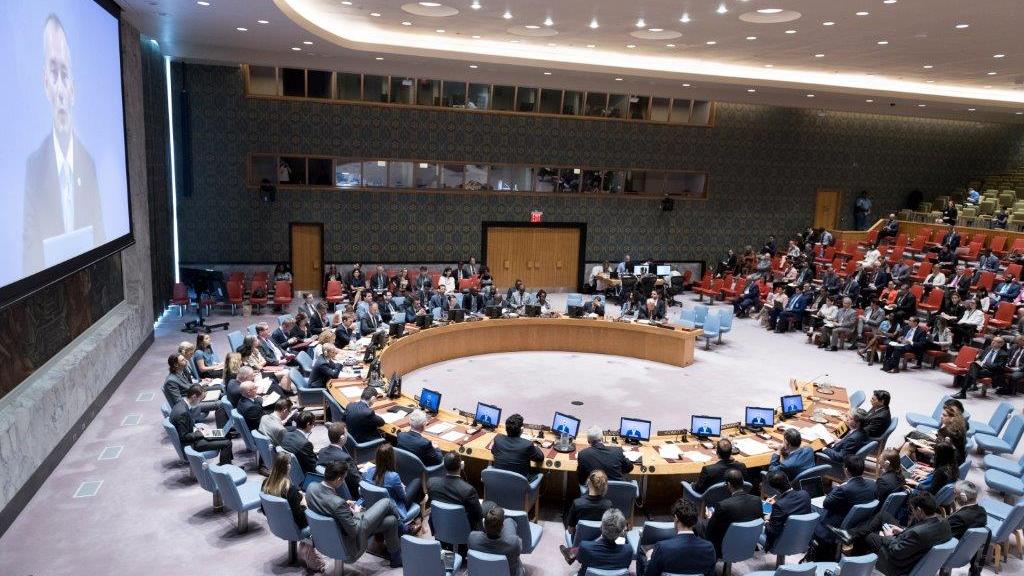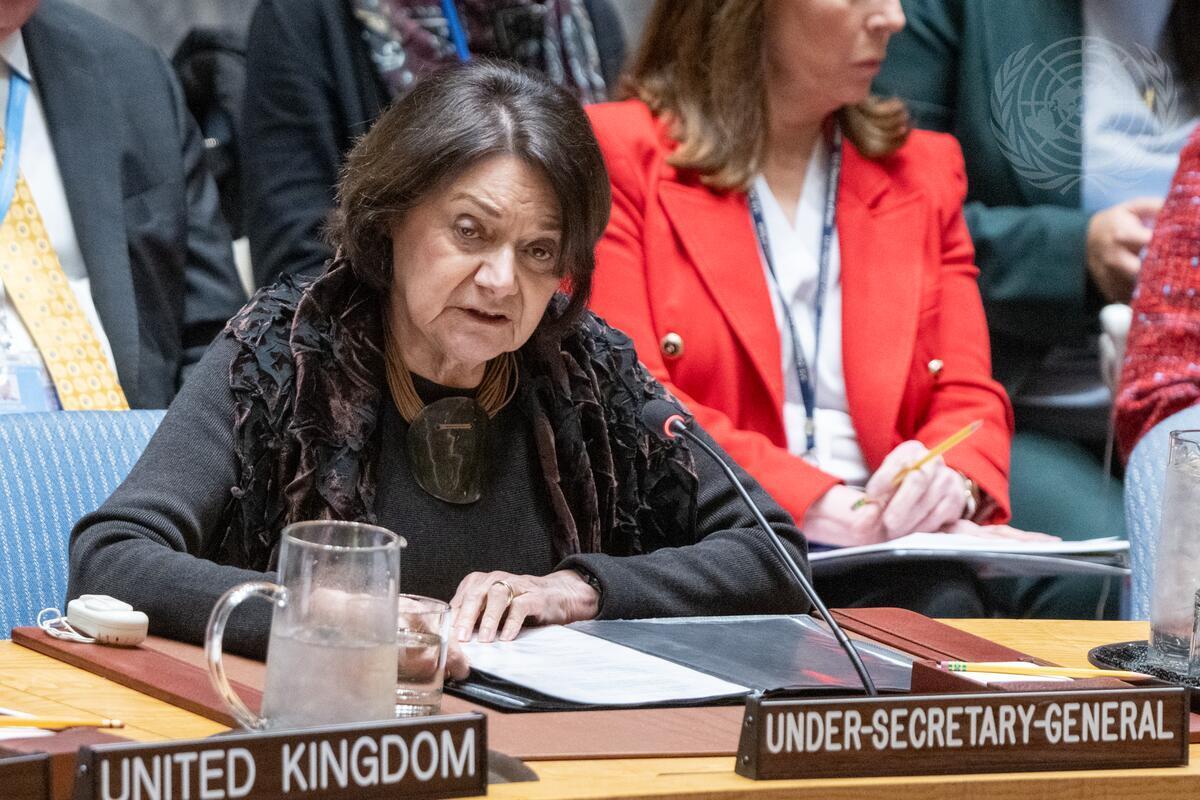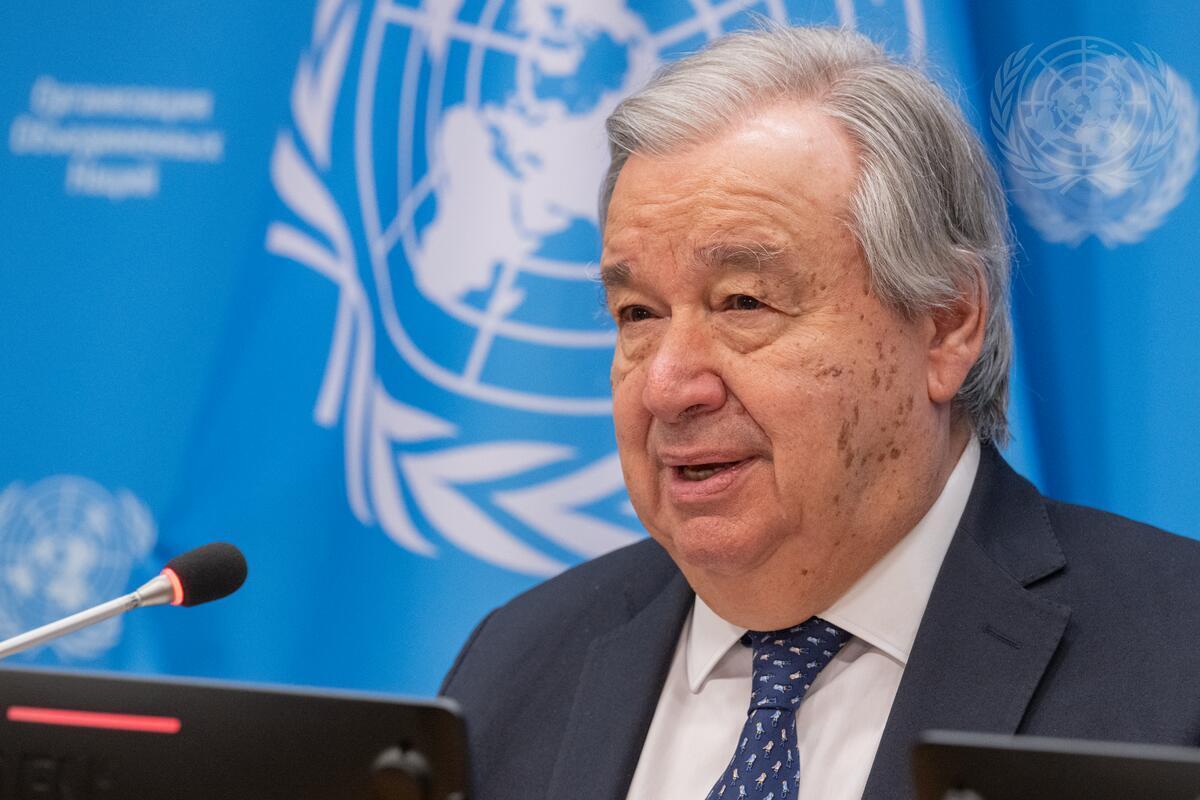Mr. President,
Members of the Security Council,
As we meet today, tensions between Syria and Israel continue to rise, while last Saturday we were minutes away from another devastating confrontation between Israel and Hamas in Gaza. It has taken an intense effort at preventive diplomacy by the United Nations and Egypt to make sure that both sides in the Gaza conflict step back from the brink and from potentially the fourth military confrontation in Gaza over the past decade.
In September 2014, shortly after the devastating 2014 conflict, my predecessor delivered the following remarks to this Council: “We must fundamentally change the dynamics in Gaza - if we do not, Gaza could implode - or yet again - explode, possibly with a new and even more deadly round of violence.”
For four long years that fragile ceasefire that has existed has been taken for granted.
For four long years the United Nations has urged concerted action to address the root causes of this man-made catastrophe – the intractable conflict, over 50 years of occupation, and over a decade of Hamas control of the Gaza strip, Palestinian division and a crippling Israeli closure regime.
And for four long years, the underlying dynamics have not improved. The humanitarian crisis has deepened, the political stalemate between Hamas and Fatah has worsened, and the prospect of another deadly round of violence is growing by the day.
Only through the repeated, collective efforts of all sides has another catastrophic escalation been averted over the past weeks.
On July15, and earlier today, I travelled to Gaza in an urgent effort to de-escalate tensions. I appealed to Palestinian factions not to provoke incidents at the fence, to immediately stop the firing of rockets and mortars and to stop the incendiary kites and balloons. And I appealed to Israel to reopen the crossings, stop shelling, particularly in populated areas, and to exercise restraint towards Gaza.
Over the last two weeks however the situation quickly spiraled out of control, nearly to a point of no-return.
Today, I reiterate my call to all in Gaza to step back from the brink. Those who seek to provoke Israelis and Palestinians to war must not succeed.
Mr. President,
The past month has witnessed one of the largest escalations since the 2014 conflict. Nineteen Palestinians, including seven children, were killed by Israel Defense Forces (IDF) in Gaza, during protests, clashes, and airstrikes, and over 1,000 have been injured. One IDF soldier was killed by gunfire from Gaza, while four Israeli civilians and one other IDF soldier were moderately injured. In the occupied West Bank, a Palestinian teenager was killed by the IDF during a search and arrest operation, while some 25 Palestinians and three Israeli soldiers were injured in various incidents.
Hamas and other militants fired 283 rockets and mortars from Gaza towards Israel. The Israeli Air Force (IAF) fired some 189 missiles and artillery shells against targets in Gaza, including against two tunnels between Gaza and Israel. Meanwhile, Egyptian Security Forces also destroyed a tunnel between Gaza and Sinai
Over a 24-hour period from 14 to 15 July alone militants fired some 220 rockets and mortars from Gaza towards Israel. One rocket directly hit a house and injured four people. Other rockets landed in the grounds of a synagogue and near a children’s playground in Sderot. The IDF fired 90 missiles and artillery shells towards what it said were military sites, injuring at least 25 Palestinians and killing two teenagers in the highly populated center of Gaza City.
On 19 July, an Israeli drone shot towards a group launching incendiary balloons, killing a Hamas militant. The next day, an IDF soldier was killed by sniper fire from Gaza, the first such fatality since the 2014 hostilities. Israel retaliated against dozens of military targets across the Strip, killing three militants claimed by Hamas’s military wing. In response, Palestinians in Gaza launched three rockets towards Israel, without injury or damage. In the early hours of 21 July, Hamas’s spokesperson announced that Hamas had agreed to restore calm. This was followed by Israeli authorities later that morning informing Israeli civilians living near the Gaza border to return to their normal routine.
Incendiary kites and balloons continued to be launched from the Gaza Strip towards Israel, triggering over 1,000 fires in surrounding communities; although, since the evening of 20 July, that number has decreased significantly. Over 8,500 acres of land have been burned, including fields, forests and agricultural land since the beginning of the launching of incendiary kites.
In other violence related to the continuing protests at the Gaza fence, on 13 July, a 15-year-old Palestinian was shot and killed by the IDF while climbing the Gaza perimeter fence; and an IDF soldier was injured by a hand grenade thrown by a Palestinian protestor. A 20-year-old Palestinian also later succumbed to injuries incurred at the fence on that same day. And on 6 July, a Palestinian was killed reportedly due to the detonation of an explosive device he was carrying.
On 2 July, four Palestinians breached the fence into Israel and reportedly attempted to set fire to an abandoned military post. The IDF shot and killed one, and injured at least one other.
Mr. President,
In reaction to the continuing launching of incendiary kites and balloons from Gaza, on 10 July, Israel closed the Kerem Shalom crossing, allowing only humanitarian supplies, food, fuel, medicines, animal fodder and livestock, and reduced the fishing zone for the Gaza strip from nine to six nautical miles. As tension continued to escalate, on 17 July, the entry of fuel and gas through the crossing was also halted, and the fishing zone was further reduced to three nautical miles.
Mr. President,
After intense efforts by the United Nations and Egypt, I can now report that the situation is calming down, although tensions remain.
I returned to Jerusalem from Gaza just an hour ago and I am hopeful that with collective efforts by all sides we can avoid another confrontation, allow Palestinians in Gaza and Israelis in communities across the border to sleep in peace and begin addressing all humanitarian issues. Today the first 100,000 litres of much-needed fuel were allowed through the Kerem Shalom crossing to be distributed by the United Nations, prioritizing hospitals and emergency services.
Mr. President,
The recent sharp escalation in violence and heightened tensions in Gaza must not divert us from our broader efforts to address the crisis.
I continue my engagement with Israeli and Palestinian counterparts as well as with regional and international partners to reduce tensions, to address humanitarian challenges and, critically, to support the Egyptian-led intra-Palestinian reconciliation process.
Advancing urgent infrastructure projects to improve the water, electricity and health systems, and creating employment that would have quick impact on the ground remains a key element of de-escalation. So is improving access and movement for the people of Gaza through Israel and Egypt. To this end, the United Nations is enhancing its presence on the ground to work with donors and international partners to facilitate the smooth implementation of projects, in full coordination with the Palestinian Authority, regional and international stakeholders.
These efforts are already gaining momentum. On 17 July, UNDP announced the implementation of various economic initiatives that will create more than 2,500 immediate and short-term job opportunities in Gaza, particularly benefitting youth and women, over a 12-month period.
But let me reiterate what I said on the 15 July: there is no point in asking donors to continue funding initiatives without a political horizon for the future. This cannot be another futile exercise in conflict management and recurring humanitarian support.
Our work is focused on restoring unity between Gaza and the West Bank under one democratic government and under one legal system where all weapons are under the control of one legitimate national authority. To achieve this, we must avoid an escalation, alleviate the suffering of people, and work to lift movement and access restrictions in line with UNSCR 1860.
Mr. President,
To move these efforts forward I have engaged with the Government of Israel, the Palestinian Authority and all stakeholders.
Last week, Norway convened a meeting of the UN, EU, World Bank and the PA to discuss coordination mechanisms to fast track interventions aimed at bolstering the water, electricity and health networks as well as temporary job creation on the ground. Yesterday, the Palestinian Prime Minister’s Office convened donors to reinforce these priorities ahead of the AHLC discussions scheduled for September.
These developments are taking place while UNRWA’s financial crisis remains a very serious concern.
UNRWA has communicated to staff that every effort will be made to mitigate the impact on the most vulnerable refugees of reductions in emergency assistance. Of particular concern, is the possibility of a delay to the start of the school year for some 526,000 students in UNRWA schools throughout its areas of operation.
At present, UNRWA needs USD 217 million to sustain its work for this year. I urge the swift mobilization of support to enable the continuity of assistance and a maintenance of stability on the ground in the region.
Mr. President,
In the West Bank, including East Jerusalem, Israeli authorities have continued the demolition and confiscation of Palestinian-owned structures.
In Khan al-Ahmar/Abu al-Helu, located on the outskirts of Jerusalem and populated by some 200 people, Israeli authorities requisitioned land, levelled access routes to the community and declared the area a closed military zone. These actions were taken in advance of the planned demolition and displacement of the entire community. The relocation site offered by the Israeli authorities – Jabal West – has been rejected by the community itself.
The fate of the community will be decided by the Israeli High Court no later than 15 August.
On July 5, in Abu Nuwar, the authorities demolished 19 structures.
Both Khan al-Ahmar and Abu Nuwar are among the 18 communities located in or adjacent to the controversial E1 area, where plans for new settlement construction would create a continuous built-up area between the Ma’ale Adumim settlement and East Jerusalem, undermining the contiguity of a future Palestinian state.
The UN Humanitarian Coordinator, along with the European Union, Norway, France, the UK, Germany and the Arab League and others, have condemned these measures. I reiterate the call on Government of Israel to cease demolitions and other measures that run contrary to its obligations under international law.
On 12 and 17 of June, in compliance with Israeli Supreme Court rulings against settlement construction on privately-owned Palestinian land, the authorities demolished 28 structures in the two illegal Israeli outposts of Netiv Ha’avot and Tapuah West.
The United Nations holds that settlement construction and related activity remains illegal under international law, and I take this opportunity to call on Israeli authorities to cease these actions.
Mr. President,
On 2 July, the Knesset passed a new law requiring the withholding of a portion of clearance revenues that Israel collects on behalf of the Palestinian Authority and transfers to Ramallah, in line with its commitments under the Paris Protocol. Funds withheld would be equal to the amount paid by Palestinian authorities to prisoners and detainees convicted, or accused, of security offenses against Israelis, to their families, as well as to families of Palestinians killed or injured in attacks against Israelis.
Implementation of this law is expected to have a significant negative impact on the Palestinian Authority’s fiscal sustainability.
I reiterate the Secretary-General’s call on all parties to refrain from unilateral actions and respect their obligations under previous agreements, UN resolutions and international law.
Mr. President,
Turning to Syria, recent developments on the Golan have heightened tensions. On 6 July, the IDF fired across the ceasefire line toward a location from which it said a shell had been launched that landed in the area of separation (AOS). On the same day, Syrian authorities informed UNDOF that the IDF had fired tank rounds across the ceasefire line at targets in the AOS.
Following the Syrian Government’s offensive to recapture the South that began on 19 June, an agreement was reached on 11 July between the non-state armed groups in Daraa and the Syrian government with Russian mediation to bring the entire Daraa Governorate under the control of the Syrian Government. By 20 July, the Government was taking control of several areas in Quneitra province, particularly near the ceasefire line.
As of 19 July, UNDOF observed approximately 2,205 tents set up for internally displaced persons (IDPs) in its area of operation. As of 23 July, the number of tents observed by UNDOF in its area of operation had decreased to some 765.
As of 20 July, almost to 203,500 Syrians, remain internally displaced across southwest Syria. Close to 70 per cent of the displaced population are located in the western part of Quneitra Governate. While the Government of Israel has made it clear that no IDPs would be permitted to enter into its territory, in the past month alone Israeli authorities have reported delivering over 100 tons of food, 370 tents, and supplies of fuel, medicine and clothing, and providing medical assistance to injured Syrian civilians.
The living conditions for the IDPs are dire, and the United Nations currently has no cross-border nor cross-line access to Quneitra. Gaining unimpeded humanitarian access to provide assistance and protection to all affected populations is critical.
On July 11, Israel informed the United Nations that it had intercepted an unmanned aerial vehicle (UAV) that had been launched from Syria into Israel and that it would “not tolerate breaches of the 1974 Separation of Forces Agreement.” That same day, UNDOF reported that three rockets had landed in locations in the AOS. Subsequently, UNDOF observed three missiles explode in the same area. The IDF announced that it had targeted three military posts in Syria in response to the infiltration of the Syrian UAV earlier in that day. On 13 July, Israel said it had fired a missile at another UAV that approached from Syria. Following each of these incidents, UNDOF liaised with both parties to de-escalate the situation.
Between 15 and 23 July, airstrikes were reported in Aleppo, Hama, and the interception of two Syrian missiles by Israel, in another sign of heighted regional tensions.
Just a few hours ago, the IDF reported that it fired two missiles, which shot down a Syrian fighter jet that they claim had infiltrated nearly two kilometres into Israeli airspace. We are closely monitoring the situation.
These hostilities demonstrate a disturbing trajectory of increasingly frequent and dangerous confrontations.
I call on all parties to abide by the provisions of the 1974 Agreement and support the role of UNDOF in that regard.
Turning to Lebanon, Acting Special Coordinator for Lebanon and Under-Secretary-General Lacroix briefed the Council yesterday. Consultations continue, as does UN advocacy, including through the International Support Group for Lebanon, to form a new government which will be able to deliver upon Lebanon’s international obligations under resolution 1701 and its national priorities, in line with recent international conferences in support of the country.
The situation in southern Lebanon and along the Blue Line remained calm overall. Ground violations of the Blue Line continued, primarily due to agricultural activity.
Mr. President,
In closing, I would like to underline the importance of expediting our collective efforts to address the perilous situation in Gaza.
Unless we begin in earnest the crucial work required to change the current deteriorating dynamics, another explosion is almost a certainty. Progress will require de-escalation and calm in Gaza, strengthened coordination with the Palestinian Authority, with Israel, which has special obligations, Egypt and the UN, in addition to financial support.
The human dimension must be at the forefront of all our efforts.
Gazans deserve to live their lives in freedom and dignity. That is their right. It is not a privilege that can be taken hostage, that can be granted or withheld by others who have no regard for their suffering.
Israelis living near Gaza also deserve to finally be free of indiscriminate attacks, be it by rockets, mortars or incendiary devices, which have plagued their lives for so many years.
We cannot lose sight of the broader context.
Another missed opportunity could have disastrous consequences, including for reaching a broader Israeli-Palestinian peace on the basis of the two-state solution, in which Gaza is an integral part of the future Palestinian state.
Thank you.






